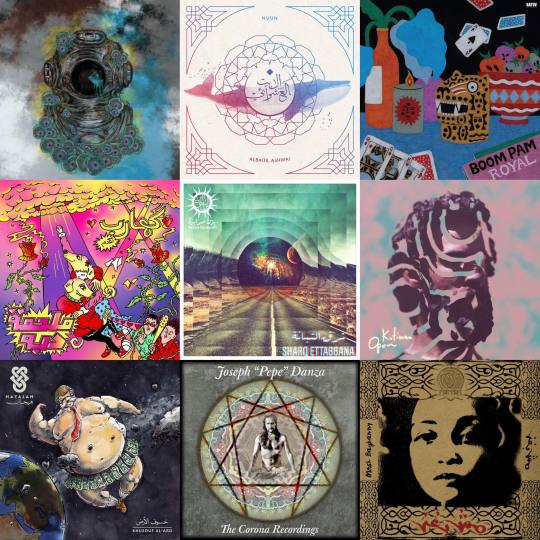#arabic folk music
Explore tagged Tumblr posts
Text

72 notes
·
View notes
Text

Tracklist:
Prologue • The Mummers' Dance • Skellig • Marco Polo • The Highwayman • La Serenissima • Night Ride Across The Caucasus • Dante's Prayer
Spotify ♪ YouTube
#hyltta-polls#polls#artist: loreena mckennitt#language: english#decade: 1990s#Celtic#Folk#Celtic New Age#Celtic Folk Music#Arabic Folk Music#Progressive Folk#Neoclassical New Age
22 notes
·
View notes
Text
#5 – 'Demetrius' (A Sun Came, 1998)

In this project, I have generally attempted to keep my expression of personal, subjective opinions on Sufjan’s music well within reason. A quick glance at any relevant online message-board would show that there is a wide diversity of opinion around his discography; some people love certain songs I dislike and dislike certain songs I love. I never wanted my writing to be totally prescriptive. The point was to explore the story of Sufjan – what do his music, his lyrics, the trajectory of his albums tell us about themselves, and about his trajectory as an artist? Every song is to be appreciated on its own terms. The wretched ‘I’ would only be a secondary consideration, included to add some colour here, some light there. Certainly I would be pleased to express my particular admiration for a song – and this is Sufjan, so I really do admire most of them.
With ‘Demetrius’, I fear I cannot help myself. This song is my least favourite Sufjan Stevens song. It is horrible. Utterly horrible.
The most credit I can give to ‘Demetrius’ is that it is certainly aware of its own horribleness, and actively leans into it. The implicit sardonicism of so much of A Sun Came is at an absolute nadir here. This song wants to be ugly and it achieves its aim. But unlike a song like ‘Satan’s Saxophones’, ‘Rice Pudding’ or even the much-later ‘Saturn’, it is not particularly noisy or dense, and so there is very little catharsis to be found in its leaden, dissonant guitar riff, its tremolo-laden backing vocals, its intentionally jarring solo. It even features an attempt at a conventional vocal melody that might have been served decently with a different accompaniment. ‘Demetrius’ is so blatantly unmusical, and yet it just sort of... washes over you. A song like this should punch, but instead it just shrugs – it is a sloppy, humid wet blanket of a thing that without fail makes my skin crawl. You don’t feel battered by it; you just feel violated.
Of note is that ‘Demetrius’ is really two songs combined into a single unit. There’s the slacker rock first half, and then there’s the second half, probably the single most offensive thing to ever make it on a Sufjan album, an inauthentic pastiche of Arabic folk music written and performed – terribly – by a Caucasian man from upstate Michigan. Now, listen. I do not want to feign outrage. I am aware that the female singer in this part, Ghadeer Yasser, has Arabic heritage; it clearly had her blessing and her input. The intent is in the right place. This does not change the fact that it is a terribly arranged piece of music (to my ears), a section that gives an abysmal impression of Arabic music to the inexperienced listener. Arabic folk music is some of the most spiritual, grand, soul-affirming music you will ever hear (listen to Fairuz, or Umm Kulthum, and bask in its splendour.) ‘Demetrius’ is not that. The woodwind line, repeating incessantly across the Arabic section, might be the most annoying melody that Sufjan has ever committed to tape, and the half-hearted rock interjections – a burst of feedback here, a clumsy drum fill there – only worsen things. When the song finally crashes into a wall of organ and cymbal noise, there is no sentiment left to feel but relief. Tetelestai!
Lyrically, ‘Demetrius’ is more surreal, indistinct Greco-Romanry on an album full of it. There are references to an archer and to Bactrian kings, but it never forms into coherent narrative, and the second verse is more concerned with forcing improbable rhymes than anything compelling. The point being that there is very little in ‘Demetrius’ to properly latch on to. You will not find anything in the music, and you certainly will not find anything in the lyrics. I hear a song like ‘Demetrius’ and all I think is ‘...why?’ Why was this necessary? What does it bring into the world? I suppose the natural rejoinder is ‘why not?’ But I have never heard a Sufjan song that fails to justify its own existence quite like this one. If you enjoy liquorice, waterboarding, waiting rooms, Mrs. Brown’s Boys or getting stabbed repeatedly in the face, this is the song for you.
#music#sufjan stevens#folk music#sufjan#arabic folk music#arabic music#fuck#pain#why do i even do this
4 notes
·
View notes
Text
youtube
Al-Namrood - Ana Al Tughian
From The Album: Diaji Al Joor (2015)
[Black Metal, Folk Metal, Arabic Folk Music]
3 notes
·
View notes
Text
youtube
Arabic Traditional Music - الموسيقى العربية التقليدية
0 notes
Text
50. Dudu Tassa & Jonny Greenwood | Jarak Qaribak

🇮🇱 Israël & 🏴 Angleterre | World Circuit | 40 minutes | 9 morceaux
"Ton voisin est ton ami". Le titre arabe de cette collaboration entre Duda Tassa, figure du rock alternatif de Tel-Aviv, et Jonny Greenwood (membre éminent de Radiohead et de The Smile mais aussi compositeur reconnu de bandes originales envoutantes) dit l’essentiel de ce projet musical. En invitant des chanteurs et des musiciens libanais 🇱🇧, égyptiens 🇪🇬, palestiniens 🇵🇸, syriens 🇸🇾 (et autres) à interpréter des chansons traditionnelles provenant d’autres pays du Moyen-Orient que le leur, l’album promeut l’idée de fraternité et de connexion humaine. On ne peut par ailleurs qu’être captivé par un habillage sonore absolument fascinant, évoquant selon les dires de Greenwood lui-même ce qu’aurait pu commettre Kraftwerk si ses membres s’étaient retrouvés dans un studio d’enregistrement du Caire à la fin des années 70s. Un message de communion sorti quatre mois avant le 7 octobre 2023 et qui mérite plus que jamais d'être entendu.

youtube
0 notes
Text
70's
This instrumental blends traditional Arabic music with orchestral arrangements. I love its rich melodies and intricate rhythms.
#Baligh Hamdi#Pop#Folk#Arabic#Oriental#Egypt#Egyptian#World music#Instrumental#1970s#70s#Music#Bandcamp
31 notes
·
View notes
Text
vimeo
Now on Vimeo!
11 notes
·
View notes
Text
This is a playlist of some of my favorite songs. There’s no specific vibe or flow, it’s very eclectic.

hope you enjoy it as much as I did making it.
#playlist#favorite songs#music#rock music#rap#hip hop#new music#alternative#gothic#shoegaze#hyperpop#pop#jazz#jazz fusion#bossa nova#arabic#classics#metal#folk#country#post punk#dnd#blues#instrumentals#electronic#edm#Spotify
9 notes
·
View notes
Text
NEW ALBUM STREAMING NOW!!!

The Singles is the new album from Marrakesh, Morocco based psychedelic rock/folk/dub/world/trip hop collective Kasbah Rockers (Barraka El Farnatshi Prod.), featuring members from mainly Algeria, Turkey, Senegal, Somalia and Cameroon, released June 28, 2024.
Listen to the full album now:
youtube
#psychedelic rock#psychedelic folk#folk#dub#world fusion#world music#trip hop#african music#middle eastern music#arab music#moroccan music#heritage harmony records#music collective#Youtube
3 notes
·
View notes
Text

Nadah El Shazly - Afqid Adh-Dhakira (I Lose Memory) From Nadah El Shazly - Ahwar (Nawa, 2017)
#2020s#Egypt#Nadah El Shazly#Experimental Folk#Avant-Folk#Arabic Music#Modern Arabic#Electronic#women in electronic music#Nawa#201#Bandcamp
5 notes
·
View notes
Text

Tracklist:
Rebirth Of The Nemesis (Enuma Elish Rewritten) • Ladders To Sumeria (Arcane Spiritual Machines) • Deluge Of Delusional Dreams (Act I - Cast Tempest From The East; Act II - Enlil's Retaliation) • Touching The Spheres Of Sephiroth (Embracing The Spheres Of Qliphoth) • Gyroscope • Double Helixed Sceptre (Where Both Ends Meet) • The Scribes Of Kur • Leper Jerusalem (The Paradox) • Sand Grain Universe (The Release) • Emissaries And The Mysterium Magnum (Annunakian Revelations) • Extemporized Ophthalmic Release
Spotify ♪ Bandcamp ♪ YouTube
#hyltta-polls#polls#artist: melechesh#language: english#decade: 2010s#Melodic Black Metal#Arabic Folk Music#Folk Metal#Black Metal
15 notes
·
View notes
Text
#17 – 'Ya Leil' (A Sun Came, 1998)

In a previous entry, I registered my strong distaste for Sufjan’s attempts at Arabic folk music. It’s an inclination of his that appears rarely, and does so entirely in his early career (thank Christ), but it frustrates me every time it pops up: it always rings slightly false to me, a painfully Orientalist affair that makes a whole culture’s music feel garish and tortured. Sufjan excels at folk, excels at electronic, and sometimes excels at rock music. Free jazz? Arguably. Harsh noise? No. And Arabic folk music? Absolutely not. I would not trust Idan Raichel to write a song in the style of ‘Casimir Pulaski Day’, and I certainly wouldn’t trust Sufjan Stevens to do a mean version of ‘Ve’Eem Tavo’ee Elay’. Staying in one’s lane can often be underrated.
‘Ya Leil’ is... somewhat spared from the damnation I afforded to ‘Demetrius’. Somewhat. But not especially. This one is long – a little under six minutes – and actually takes its time to develop rather than impatiently launching into a peak of energy from minute one. It also makes far more prominent use of instruments that Sufjan knows well. Aside from the expected instrumental choices – tin whistle, recorder, sitar – ‘Ya Leil’ makes very prominent use of a banjo, which more or less carries the song’s core instrumental melody in the first half. It is altogether a far less abrasive listening experience than one might expect. There is care and delicacy afforded to ‘Ya Leil’, and coming off ‘Demetrius’, that alone is refreshing.
Vocal duties are once again handled by Ghadeer Yasser, who repeats a single mantric phrase – ‘’Ah ya eayni ya layl’, translated to English as ‘Oh my eye, O night�� – but she feels mostly sidelined here (which I feel is for the best; her voice is not especially strong on either of the songs that she appears on). The focus is on the instrumental, which laps at your ears, receding and progressing with regularity. The main progression starts, and then a few bars later it ends, and the song recedes into silence again. If this feels a little awkward, that’s because it is. The song would be much better served with a more consistent, droning structure, because then it could hypnotise, and full alertness does not serve Sufjan’s forays into Arabic songwriting particularly well.
This is, of course, only the case for the first half. The second half of ‘Ya Leil’ cuts the vocals and ups the tempo substantially, launching into a section highly reminiscent of the end of ‘A Winner Needs a Wand’. This portion feels more generically non-Western than it does specifically Middle Eastern, and hints of Celtic influence appear in the dancing tin whistle melody. I can appreciate the tangible kinetic energy in this portion, even if it’s executed better elsewhere on this same album.
‘Ya Leil’ really does not seem so bad in isolation. It’s really not so bad in context either. But when you’re sixty minutes into a nearly seventy-minute Sufjan Stevens debut that has a surfeit of ‘humour me, I’m just experimenting’ moments, ones that are often incredibly grating, the last thing that your ears are asking for is a white guy from Michigan emulating a style that he generally executes poorly. This was my least favourite track on A Sun Came on first listen; I have softened on it now, but my overall stance remains unchanged. In a survey of Stevens’ many and varied achievements, a song like ‘Ya Leil’ could simply never enter the conversation.
4 notes
·
View notes
Text
youtube
Al-Namrood - Ashab Al Aika
From The Album: Kitab Al Awthan (2012)
[Black Metal, Folk Metal, Arabic Folk Music]
2 notes
·
View notes
Text
Levantine Week: Day 7: Regional Psychedelic, Funk, Blues, Folk and Indie Rock Hidden Gems - Part 2

For Day 7 of Levantine Week James presents the second of a two part look at some of the finest psychedelic, funk, blues, folk and indie rock that the region has to offer. With artists from Israel, Egypt, Cyprus and Jordan, there is plenty of variety to be had. Each act brings its own unique blend of styles and influences, many drawing of the music of their country and region to create something fresh and new through fusion. So, dig in and see what the Levant has to offer.
This article looks at:
Mental Soup - Journey Through the Abyss (Cyprus)
Albaitil Ashwai البيت العشوائي - Nuun (Jordan)
Boom Pam - Royal (Israel) (Batov Records)
كهارب/Kahareb - Malhamet Debba / ملحمة دبه
Yazan Tariq Sarayrah | (يزن صرايرة (السّلايتس - SHARQ ETTABBANA | شرق التبانة (Jordan)
Kutiman - Open (Israel) (Kartel Musicgroup)
Hayajan - Khusouf Al-Ard (Jordan)
Joseph Pepe Danza - The Corona Recordings (Israel) (JOMO Music)
Maryam Saleh - Mesh Baghanny (Egypt)
#psychedelic rock#heavy psych#blues#indie rock#folk rock#world music#arab rock#arabic music#cave dweller music#middle eastern music#underground music#funk music#funk#rock music#Bandcamp
2 notes
·
View notes
Text
album recommendation
"Woledto" (2024) by Elyanna [artist's website] [spotify]




The newest album by Chilean-Palestinian pop princess, Elyanna. Energetic, heartfelt, genuine, cool.
genres: pop, r&b, jazz, inspired by levantine folk and zajal.
fav songs: "Ganeni", "Lel Ya Lel", "Kon Nafsak."
#best of 2024#elyanna#woledto#album recommendation#music recs#palestinian pop#jazz#r&b#levantine folk#arab pop#zajal
1 note
·
View note